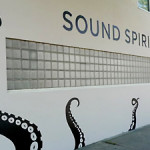
Oh Scopolamine, could I count the ways I know thee? Many marine scientists know this sea-sickness drug well and affectionately refer to it as “the patch”. Typically during the first few days of an expedition, you will see many of the science party sporting these fashionable icons of the industry. I myself have used it twice, the first time being a desperate measure during a “rough” transit. The key to its effectiveness is using it before you will be in a situation that makes you sick, not during as it takes a while to settle in.
Additionally, Scopolamine has the added benefits of breathing difficulty; closing of the throat; lip, tongue or face swelling; hives; pain and redness of the eyes; dry or itchy eyes; dilated pupils; difficulty urinating; confusion; agitation; rambling speech; hallucinations; paranoia; delusions; drowsiness; dizziness; dry mouth; restlessness; blurred vision; flushing; fast heartbeats and nausea, vomitting, headache and poor coordination may occur if you discontinue prematurely. Great stuff. I’ve known people to be afflicted with several of these side effects. Myself, I mostly experience dry mouth, dizziness, itchy red eyes, agitation/restlessness and lots of drowsiness. I used the patch preemptively on my last cruise for the first 4-5 days and didn’t have a problem with sea sickness the 4 weeks we were out bobbing around in the Pacific. Miriam had a nice article on seasick oceanographers last April with even more remedies.
I came across a news article that states Scopolamine can now be used to treat bipolar disorder too!
Like lithium, some of the latest crop of early candidate drugs revealed their potential simply by chance.
Take the experience of NIMH researchers Maura Furey and Dr. Wayne Drevets with the drug scopolamine, which is normally used to keep people from getting seasick or carsick. Several years ago, they were studying whether scopolamine could improve memory and attention in depressed people. So they gave the drug intravenously to depressed patients, trying to find the right dose for a brain-imaging study.
They noticed that patients started feeling less depressed the night after the injections. Most antidepressants take weeks to kick in.
“Some patients would say it was the best night of sleep they’d had in many years, and the next morning they woke up feeling a substantial lifting of their depression,” Drevets said. “In many cases that improvement persisted for weeks or even months.”
It certainly helps you sleep! I think I slept away most of the bad weather when I took it that first time. I am pretty surprised at how fast it reduces depression though. Depression is a serious matter and I hope that this helps, but it won’t be the answer for everyone, just as it doesn’t work for everyone to alleviate seasickness.





